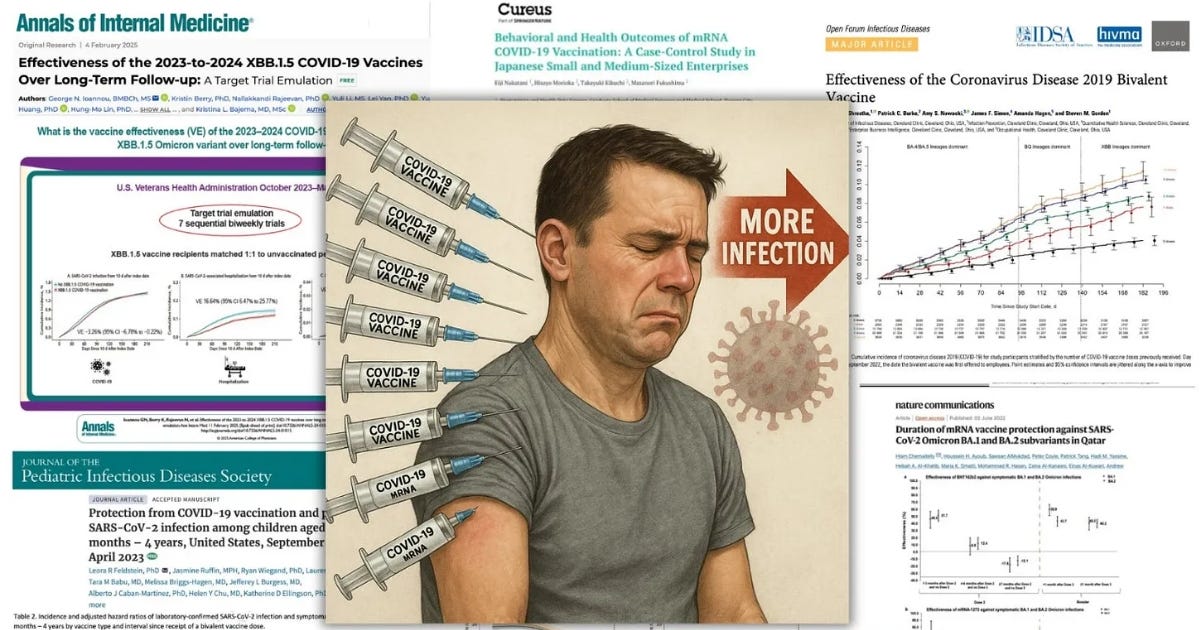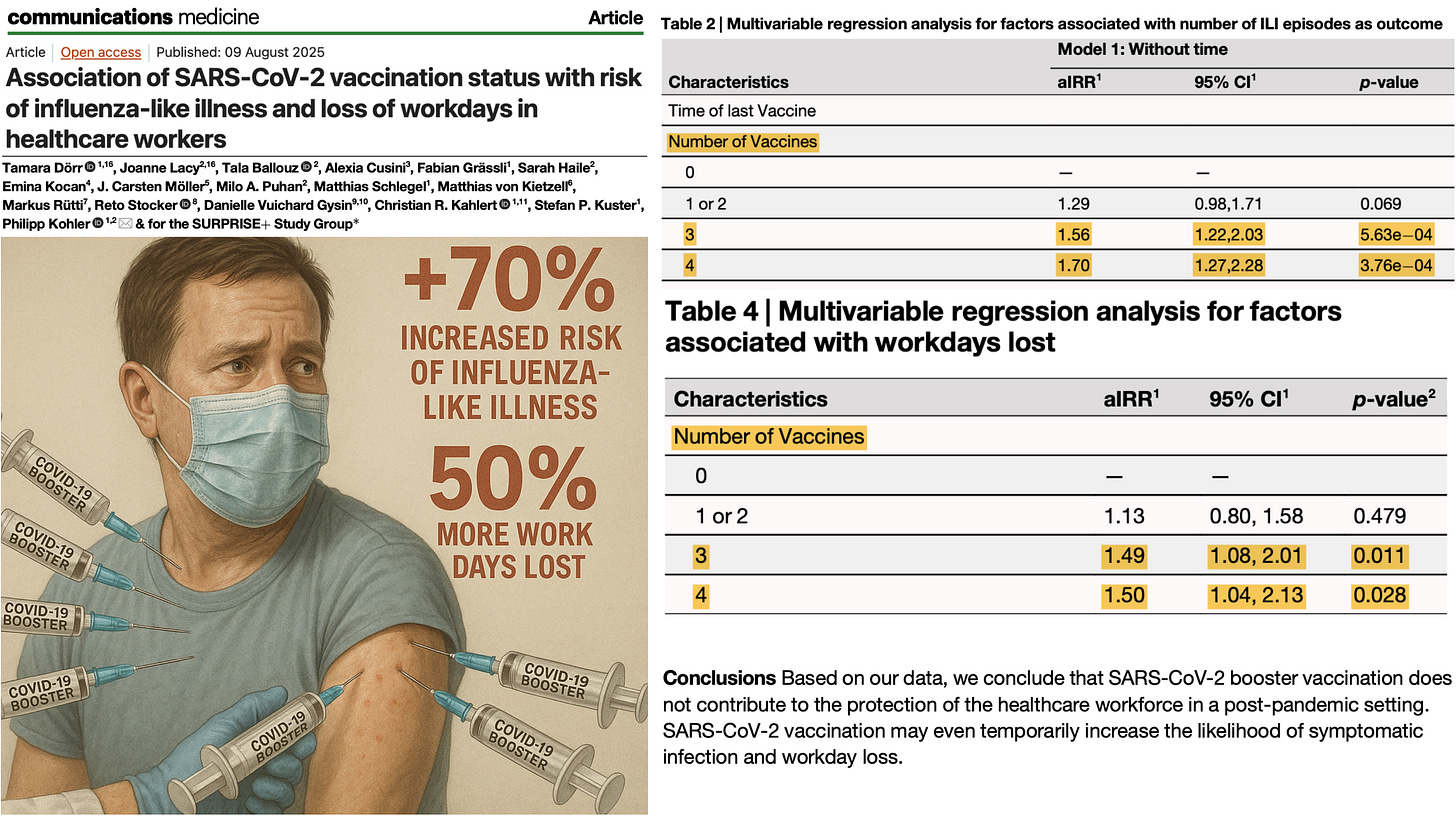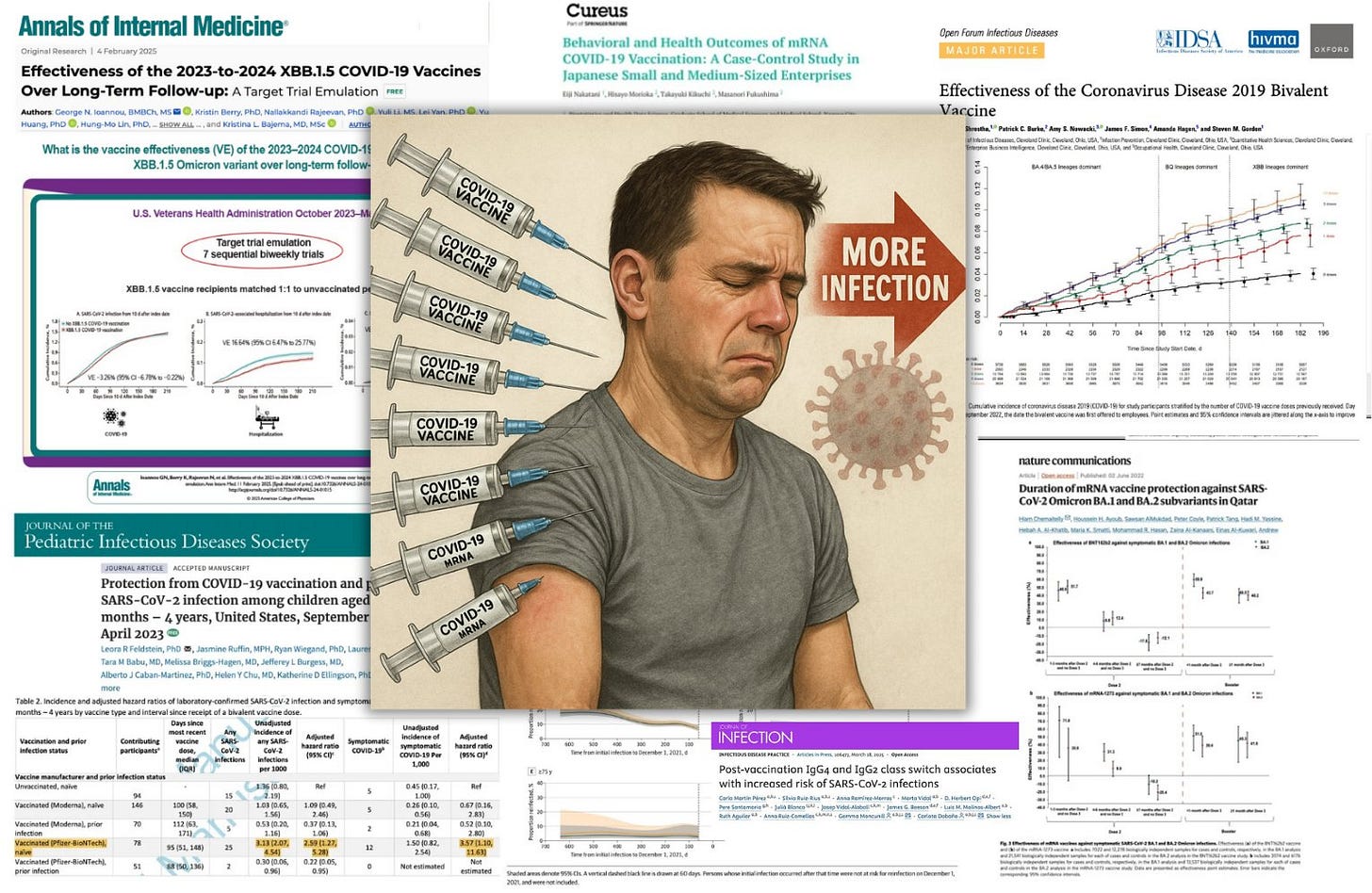Eighth Study Confirms mRNA Shots Increase Infection Risk
It’s time to return to common-sense principles and remove this dangerous product from the market.
This article originally appeared on Focal Points and was republished with permission.
Guest post by Nicolas Hulscher, MPH
New study of 1,745 healthcare workers finds mRNA boosters raise risk of influenza-like illness by up to 70% and increase workdays lost by 50%.
A major Swiss study of 1,745 healthcare workers, published in Nature’s Communications Medicine, found that recent COVID-19 booster shots were linked to a significantly higher risk of illness and missed work compared to the unvaccinated.
The illness measured was Influenza-Like Illness (ILI) — sudden onset of fever (≥38°C or feeling feverish) plus at least one respiratory symptom (cough, sore throat, runny nose, loss of smell) within 7 days.
National surveillance showed that during the study period, ~21% of ILI cases were COVID-19, ~20% were influenza, and the rest were caused by other respiratory viruses — meaning boosters increase risk of infection from multiple different pathogens:
3 doses: aIRR 1.56 (95% CI 1.22–2.03) — 56% higher risk of ILI vs. unvaccinated.
4 doses: aIRR 1.70 (95% CI 1.27–2.28) — 70% higher risk.
More recent boosters: aIRR 1.32 (95% CI 1.07–1.62) — strongest effect soon after vaccination.
More Sick Days After Boosters
3 doses: aIRR 1.49 (95% CI 1.08–2.01) — 49% more workdays lost.
4 doses: aIRR 1.50 (95% CI 1.04–2.13) — 50% more workdays lost.
Robust Even After Adjusting for Confounders
Inverse probability weighting confirmed the association: recent boosters aIRR 1.26 (95% CI 1.12–1.43).
#ad: Your diet isn’t perfect—and that’s okay.
Global Healing’s Organic Multivitamin is here to help you fill the gaps with over 30 essential vitamins and minerals your body needs to feel its best.
There are no coatings, no fillers—just clean, high-quality nutrients your body can actually use. It’s a simple, effective way to support your daily health and give your body the care it deserves.
Experience the difference you can actually feel. Use code VFOX at checkout for 10% off your order.
DISCLOSURE: This is an affiliate link. I may earn a commission if you make a purchase here, at no additional cost to you.
These Findings Corroborate SEVEN Other Studies Showing COVID-19 “Vaccines” Increase Infection Risk
Shrestha et al. (Cleveland Clinic) – COVID-19 risk increased with dose count:
1 dose → +107% risk (HR 2.07, 95% CI: 1.70–2.52)
≥3 doses → +253% risk (HR 3.53, 95% CI: 2.97–4.20)
Feldstein et al. (CDC) – Pfizer-vaccinated children without prior infection:
+159% risk of infection (HR 2.59, 95% CI: 1.27–5.28)
+257% risk of symptomatic COVID-19 (HR 3.57, 95% CI: 1.10–11.63)
Perez et al. – More mRNA doses → IgG4 antibody levels ↑ 11× → 1.8× higher infection risk.
Ioannou et al. – Vaccine effectiveness against infection was -3.26% (95% CI: -6.78% to -0.22%) — meaning higher infection rates in the vaccinated group.
Nakatani et al. – Vaccinated individuals had +85% infection odds vs. unvaccinated (OR 1.85, 95% CI: 1.33–2.57).
Eythorsson et al. – 2+ doses → +42% reinfection risk vs. ≤1 dose (95% CI: 1.13–1.78).
Chemaitelly et al. – Effectiveness against Omicron BA.1 & BA.2 infections turned negative within 7 months:
Pfizer: 46.6% → -17.8%, 51.7% → -12.1%
Moderna: 71.0% → -10.2%, 35.9% → -20.4%
These data make it clear: mRNA technology for infectious diseases is acting as an infection promoter. It’s time to return to common-sense public health principles and remove this dangerous gene-transfer platform from the market.
Epidemiologist and Foundation Administrator, McCullough Foundation
www.mcculloughfnd.org
Please consider following both the McCullough Foundation and my personal account on X (formerly Twitter) for further content.
Copyright 2025 Focal Points





